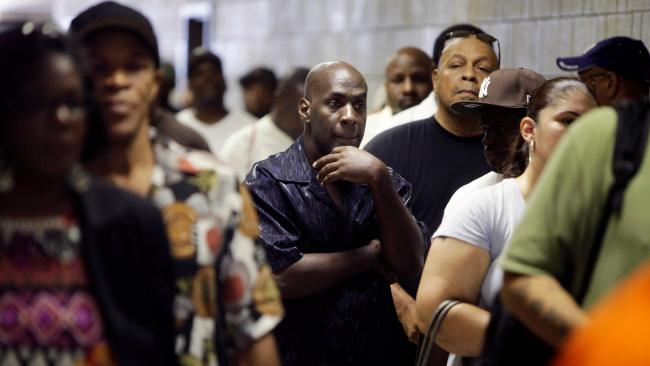(ThyBlackMan.com) In Avatar the hero steps into a strange New World and, Tarzan-like, becomes not only a fully accepted member of the group, but he actually understands the natural world they have lived in for countless generations better than they do, and goes on to lead them in a titanic struggle for survival. It just so happens that in the course of the fighting, the “King” and the “Prince” of the Na’vi both die, and so the hero, Jesus, I mean Jake, is left as the Supreme Leader. And the princess with whom he has already “mated for life” is his wife, the Queen.
The word Avatar is a Hindu word meaning the earthly manifestation of the god Vishnu, the Master and Sustainer of Life. Yes, “avatar” is also commonly used to refer to the visual representation of a player in a video game. But is not the human player god-like in comparison to the other characters in a video game? Same here as Jake of the “Sky People” descends to live amongst the Na’vi, the natives. Note how the 3-D glasses enable the viewer to make a transition that parallels Jake’s. As the moviegoer enters the new world of 3-D/IMAX, Jake actually becomes the viewer’s representative, or avatar. And vice versa. The viewer, like Jake, becomes the manifestation of a god amongst the Na’vi, the ![]() people of Pandora.
people of Pandora.
Pandora refers to Pandora’s box, the box in Greek mythology, that was opened by a woman named Pandora, that forever changed the world. The film Avatar is intended to forever change the way in which we watch movies, and TV, that is, the way we experience the world through the mass media.
Who exactly are the Na’vi, the natives? Let’s see. They are tall and they have color in their skin. They are tall people of color who are great basketball players. Yes, basketball players. Recall when Jake first enters his new body and steps out into the world, what is the first thing he sees? Two Na’vi playing basketball, a man and a woman. And the woman actually says to the man, “You ain’t got no stuff.” Could the director make it any clearer? The Na’vi are Black people.
In fact, they are Zulus. Listen to their intonations and then recall the speech pattern of South Africans. Particularly note the speech and mannerisms of the King and the Prince that Jake defeats. They are exact parallels of the Zulu warriors portrayed in films about Shaka and the Zulu. Shaka was the greatest warrior of the greatest warrior nation in Southern Africa, and the film symbolizes his defeat by a white man. Something that never happened in real life.
By the way, the actor who plays Jake is Sam Worthington, an Australian. In Avatar he plays a super Crocodile Dundee the white man who plays a Tarzan-like figure among the Australian aborigines in Hollywood movies. In reality, the Aborigines suffered a holocaust of unbelievable proportions at the hands of the British.
“EYWAH” is the name the Na’vi use to refer to the Creator. “EYWAH” is a scrambling of the letters in “YAHWEH” the Hebrew name for the Creator. At the beginning of the film Sigourney Weaver’s character, Grace, says in reference to the Tree of Souls, “I would give my life to get a sample of it.” That is exactly what happens at the end. She dies at the base of the Tree of Souls and the Na’vi princess says, “Grace is with Eywah.” Of course. Isn’t the Creator full of grace? So we see that Sigourney Weaver’s character, as denoted by her very name, Grace, from the beginning possesses an attribute of God and at the end becomes one with Eywah, Yahweh, God, the Creator.
Early in the film when Jake encounters a monster, he boldly says “Who’s bad? Who’s bad?” in a blatant ripoff of Michael Jackson. And Jake is really, really BAAAD. He not only leads the Na’vi, he rides the fiercest bird and, through his fervent prayer at the Tree of Souls, he gets EYWAH to violate the rule of non-interference and actually help the Na’vi by turning all the creatures of the forest against the intruders.
The leader of the intruders is the fierce blond Marine colonel who in his climactic battle with dark haired Jake says point blank, “You betrayed your race.” Earlier he says that he and his men will burn a hole in the Na’vis “racial memory.”
Note that Jake has bigger muscles than the Prince he dethrones. And when he makes the first jump or transition to his new body, there is a closeup of him with his eyes closed and his face is made to appear much darker than it really is. Both of these things are done to make his transition into, and ultimate conquest of, the New World, and its inhabitants, much more logical, palatable and inevitable….

















Thank you, Alan for that history of the Zulus.
As the author of a book about the Zulus I’d have to agree and disagree with Arthur.
The idea of a white guy becoming one with the “natives” and taking over the tribes definitely has its basis in truth and legend. Tarzan is one and so is Dances with Wolves and it was a recurring theme of colonial writing (Kipling’s “Man Who Would Be King”, Haggard “King Solomon’s Mines”, Buchan’s “Prester John”).
However, it would be hard to pin Avatar on the Zulu legends even though it coughs up enough mythology and religion to make you wonder. Sure, the language is sing-a-long-ish but hardly Zulu and without the signature clicks.
Shaka was never conquered by the British. In fact, he fought with a group of them against one of his persistent enemies and gave them an outpost in the sheltered bay of what is now Durban, so that he could observe and learn from them.
However, there really is an “Avatar” story about a white guy trying to take over the Zulus – but it is an altogether very different tale that my graphic novel “White Shaka Boy” is all about.
It happened in 1858 when the Zulu King, Cetswayo invited a certain white hunter to become a chief and set up a kraal in the coastal section of what is now KwaZulu. It all went well until the Anglo-Zulu War of 1879. You’ll have to read the rest of my book to get the low down, but it all came down to this: sooner or later the “crossover guy” has to pick sides and, true to form, he tried to take over the Zulus (hence the ironic title).
It is fair to argue that many, if not all of these legendary stories were based on this one character and that all those authors would just as soon you forgot him (which most people did).
Why?
His 49 Zulu wives and 112 bi-racial children set him apart from every self-respecting colonial white and generated its own suspicions among the Zulus.
There’s a bit of the Obama here – but in reverse. And it’s not Hollywood – it’s all true.
“White Shaka Boy” covers the true story and plays it forward to today…….